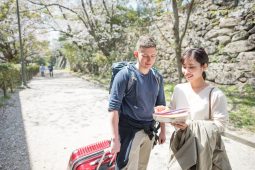When you’re learning on your own
The single biggest improvement to your quality of life in Japan will be learning Japanese. This cannot be overstated. Yes, you can get by in major cities without it, but the more Japanese you learn the better your life will be. You’ll make more friends, understand the world around you better, and make work go more smoothly.
The problem is, of course, it’s not that simple a thing. Classes require scheduling, money, and time that might not be that easy to handle. Also, it can be tricky to find a class that fits your own style of learning and a teacher that meshes with your needs or personality. Or, you might just not be in a place that offers good classes (this was my issue). Sometimes, you would rather just study on your own.
Luckily, there are all kinds of ways to study on your own to help you on this path. This series will outline some of the challenges you might face, and hopefully some ways to get past them. This first installment, though, is going to be less about specific study techniques and more about preparing yourself for this challenge you face.
Tip #1: Open your mind
Learning any new language will require more than just remembering words and grammar. It will require accepting new ways of describing and understanding the world. You will often want to ask, “Why does it work this way?” Don’t. Just let it go. There is no way to answer that question that will make you feel better. It just is.
Accept the way the language works because that’s the way it works. Yes, it can be confusing to leave out the subject when you’re not used to it. Yes, kanji are often hard to remember, and the multiple pronunciations are a pain. Trust me, your own native language (no matter what it is) has tons of things that make it confusing to adult learners, but you had the good fortune to learn it as a child. Children don’t fight language; they absorb it so they can get what they need. Do that, and you’re on your way to true learning.
Tip #2: Be as social as you can
Learning on your own is not the same as learning alone. Language is a tool for communication, and communication is the best way to learn a language. If you are at all comfortable doing so, try to get out there and interact with native speakers.
One good way to interact with locals and practice your Japanese is your local izakaya 居酒屋. These pub-like places serve light meals and drinks, and are usually full of neighborhood residents in the perfect mood to talk. But the later it gets the more lively the mood, usually, so this might be best for night owls!
Of course, even if you prefer a different atmosphere, speaking to native speakers is still the best practice, so try to find a friendly local café or other public social space to practice in. Go to festivals and other big events where people are naturally more sociable. Go to the library when they have read-alongs for children. Be active!
The internet is the biggest social tool in history. Seeking out local mixing events on Meetup, Facebook, or other social media is a really great way to make contacts with local people open to international communication, either face to face or purely online if you’d prefer it. You can also find people online to set up ongoing language exchanges to help each other learn, just be sure that any “exchange” you get into actually goes both ways. Some people are more eager to practice their English (or other language) than to help you with your Japanese. It helps to be assertive in maintaining a balanced exchange.
A quick note on safety: Japanese is generally a safe country, but it is not 100% safe (nowhere is!). There are people with bad intent here, and there are those ready to exploit the trust of the vulnerable (and those who have not mastered the local language, and are not native to the country, are indeed vulnerable). Always keep meetings public and trust your instincts when setting up exchanges. Don’t let strangers into your home, or even know where your home is, if it can be avoided. Let friends know when and where you are meeting people.
Tip #3: Don’t beat yourself up
We all have our own challenges and learn in our own ways. Comparing yourself to others is rarely a good idea, and usually leads to negativity. None of this is helpful, and is not at all necessary. Do what you can, and don’t fret setbacks.
It is vital to remember that mistakes are 100% guaranteed, and are the key to real learning. Making a mistake, realizing it, then learning to fix it is far more effective than worrying so much about making mistakes you don’t push yourself.
There are, of course, tons of other things one can do to prepare, but in the end, it all comes down to finding your own best path.
In conclusion…
Just get started! Nothing will get better until you take that first step. In future articles I’ll be offering more specific, concrete tips on studying, but don’t ignore these basic tips. A solid mental foundation will help you build lasting language progress!
頑張って! Ganbatte! Do your best!
We also have an article on selecting materials for learning by yourself.








